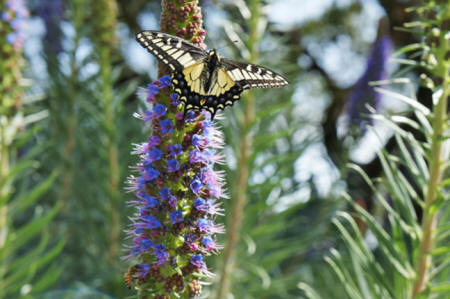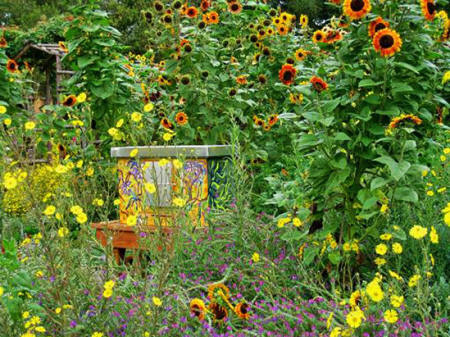|
Anise Swallowtail on Echium (©The Melissa Garden)
In our de-ritualized world, we face the challenge of finding the means to reconnect with core aspects of life and of finding guidance for being with the bees.
In his bee lectures, the Austrian philosopher and spiritual scientist Rudolf Steiner describes the bien (a term defining the bee colony as one being) as being permeated with life based on love.
To meet the bien on that level and be touched by it will bring forth a new way of living with bees. The bien can become a metaphor for our interconnectedness with the world and it can make the oneness of our life palpable. Infused by a radical different sense of self, it resonates within the depths of our own hearts.
The bees can change our sense of who we think we are
and instill in us a wish to serve.
Steiner emphasizes that,
In the end, the world shows us whenever the soul element is missing in our lives.
The current plight of the bees shows us the repercussions of our limitations. As our life-long allies, the bees mirror our own struggle to live in this world. Their encouraging message is to wake up - to wake up to this fragile, wonderful and precious world, to wake up to a heart-centered reality.
May we all wake up...!
The Melissa Garden?
from
TheMelissaGarden Website
That was the question in November, 2007 Barbara
and Jacques Schlumberger asked wildlife garden specialist,
Kate Frey.
The Melissa Garden is a new project that began in the fall of 2007 by Barbara and Jacques Schlumberger at their home.
The garden initially began with a concern about the plight of honeybees, but when Barbara and Jacques realized that many native bees, butterflies and bird populations are also declining, they wanted to embrace their needs and the necessity to educate people about their status as well.
The goal is to provide honeybees, native bees and other pollinators with an almost year-round source of floral resources- free from pesticides.
Studies have found that native bees and honeybees both benefit from feeding on a variety of flowers, so almost year-round the garden is kept filled with an abundance of annuals, perennials and shrubs that offer attractive pollen and nectar to insect visitors.
The garden is composed of a mixture of plants native
to California, many Mediterranean plants and others that are
appropriate for the site and climate.
Many people have came to visit, bee-tenders, mothers groups, children, school classes, University of California Master Gardeners, garden clubs, professional gardeners, scientists and the general public who are concerned about the plight of honeybees and nature and biodiversity in general, and wanted to learn about gardens that support them.
The gardens vibrant colors, naturalistic plant compositions, and intense buzzing life have created deep connections with people, and many share very touching early and present associations with nature.
A lot of people leave inspired to plant their own pollinator or habitat gardens, fulfilling exactly the main goal of the project.
These plants are not self-compatible and require cross-pollination with others of the same species- in the same way that in an orchard-pollinator trees are required. Studies have shown that where native generalist pollinators like bumblebees are lacking, native plants requiring insect pollination decline.
Pollination is essential for plant reproduction and for ecosystems to endure.
In addition, pollinators are an essential part of the foodweb for birds and may form up to 20% of their diet. Some 93% of birds feed their young insects, so where you have insects you have birds.
Appropriate flowers for pollinators are the basis for these processes of life. Pollinators may be native bees, honeybees, wasps, syrphid flies, tachinid flies, beetles, butterflies, moths and birds. Each has a distinct life cycle and needs. Observing and learning about them is our joy.
Sharing this experience with people and our
communities is why we developed The Melissa Garden.
...are all factors contributing to stress and decline in bee health and populations.
Native bee and many other native organisms- insect
and bird- populations are likewise suffering from habitat
fragmentation and loss due to urban development and intensive
agriculture, displacement by exotic species, pesticide use and for
some bumblebee species, introduced pests and diseases.
Also, in Greek mythology, Melissa is the name of one of the nymphs that fed Zeus honey as an infant while hiding him from his father, Cronus. When Cronus discovered this, he turned her into a worm. After Zeus came into power, he changed her into a queen bee, not being able to change her from an insect form.
Melissa is a Greek word meaning honeybee.
|


